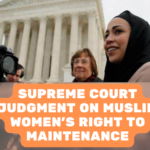Context
The recent Supreme Court judgment in “Mohd Abdul Samad vs The State of Telangana” has reaffirmed that the Muslim Women Act of 1986 does not override the rights of divorced Muslim women to claim maintenance under Section 125 of the Criminal Procedure Code (CrPC).
Issue
A Muslim man contested an order requiring him to pay maintenance to his divorced wife under Section 125 of the CrPC. He argued that the Muslim Women Act of 1986, which has specific provisions for maintenance, should take precedence over Section 125. He claimed that this Act gives Magistrates the authority to handle maintenance and other related issues, not family courts.
Section 125 of the CrPC
Section 125 of the CrPC empowers a Magistrate to order a person with sufficient means to provide monthly maintenance to:
- His wife, if she cannot maintain herself.
- His minor child (legitimate or illegitimate) who cannot maintain itself.
- His adult children with physical or mental disabilities who cannot maintain themselves.
- His father or mother, if they cannot maintain themselves.
This section aims to safeguard the rights of individuals who cannot support themselves, ensuring their financial stability and social security.
Muslim Women Act of 1986
Enacted after the landmark Shah Bano case in 1985, the Muslim Women (Protection of Rights on Divorce) Act ensures that divorced Muslim women receive fair maintenance from their former husbands during the iddat period (typically three months post-divorce). The Act also addresses the payment of mahr (dower) and the return of properties received at the time of marriage.
Importantly, the Act allows divorced couples to choose to be governed by Sections 125 to 128 of the CrPC for maintenance if they declare so jointly or separately at the first hearing of the application.
2009 Shabana Bano Case
The Supreme Court’s decision in the Shabana Bano case reaffirmed that divorced Muslim women could claim maintenance under Section 125 of the CrPC even after the iddat period, provided they do not remarry. This decision highlighted the application of secular legal provisions, ensuring that religious affiliation does not preclude the right to maintenance.
Supreme Court’s Ruling
The Supreme Court’s recent judgment reiterated that:
- Section 125 of the CrPC applies universally to all women, including Muslim women, irrespective of the Muslim Women Act of 1986.
- Muslim women can seek maintenance under Section 125 of the CrPC, regardless of the special provisions of the 1986 Act.
Significance of the Decision
- Affirmation of Equality: The decision underscores the Supreme Court’s commitment to equality and non-discrimination, particularly for divorced Muslim women seeking maintenance.
- Financial Empowerment: The ruling emphasizes the importance of financial empowerment for women who lack independent income, differentiating between economically active married women and those reliant on support for their personal expenses.
- Right to Maintenance: The Court affirmed that divorced Muslim women, including those divorced through triple talaq (which has been declared void and criminalized), retain the right to seek maintenance under Section 125 of the CrPC, reinforcing the principle of equitable treatment under Indian law.
Importance of the Right to Maintenance
- Financial Independence: Ensures women have financial support to meet their daily needs, especially if they lack independent income.
- Social Security: Provides a safety net for women, particularly in cases of divorce or separation, reducing vulnerability to poverty and homelessness.
- Equality and Rights: Upholds principles of gender equality, ensuring women have access to resources similar to men in similar circumstances.
- Legal Protection: Offers legal recourse for women facing economic hardship due to marital breakdown or abandonment.
- Child Welfare: Supports the well-being of children, ensuring they have adequate support from both parents.
- Dignity and Well-being: Promotes the dignity and well-being of women by recognizing their right to financial support irrespective of their marital status.
In summary, the Supreme Court’s judgment reinforces the legal framework ensuring financial support for divorced Muslim women, upholding their rights and promoting gender equality and social security.


